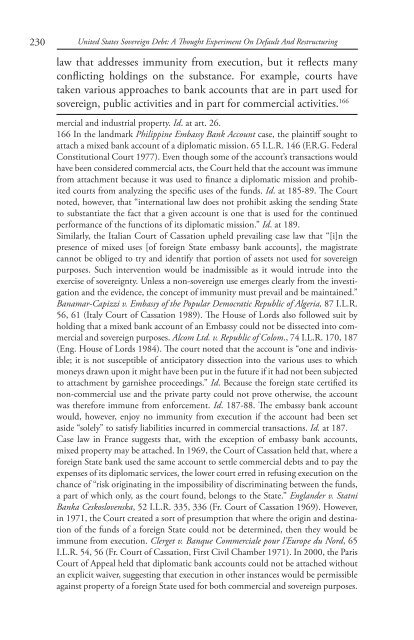US Government Debt Different - Finance Department - University of ...
US Government Debt Different - Finance Department - University of ...
US Government Debt Different - Finance Department - University of ...
You also want an ePaper? Increase the reach of your titles
YUMPU automatically turns print PDFs into web optimized ePapers that Google loves.
230 United States Sovereign <strong>Debt</strong>: A Thought Experiment On Default And Restructuringlaw that addresses immunity from execution, but it reflects manyconflicting holdings on the substance. For example, courts havetaken various approaches to bank accounts that are in part used forsovereign, public activities and in part for commercial activities. 166mercial and industrial property. Id. at art. 26.166 In the landmark Philippine Embassy Bank Account case, the plaintiff sought toattach a mixed bank account <strong>of</strong> a diplomatic mission. 65 I.L.R. 146 (F.R.G. FederalConstitutional Court 1977). Even though some <strong>of</strong> the account’s transactions wouldhave been considered commercial acts, the Court held that the account was immunefrom attachment because it was used to finance a diplomatic mission and prohibitedcourts from analyzing the specific uses <strong>of</strong> the funds. Id. at 185-89. The Courtnoted, however, that “international law does not prohibit asking the sending Stateto substantiate the fact that a given account is one that is used for the continuedperformance <strong>of</strong> the functions <strong>of</strong> its diplomatic mission.” Id. at 189.Similarly, the Italian Court <strong>of</strong> Cassation upheld prevailing case law that “[i]n thepresence <strong>of</strong> mixed uses [<strong>of</strong> foreign State embassy bank accounts], the magistratecannot be obliged to try and identify that portion <strong>of</strong> assets not used for sovereignpurposes. Such intervention would be inadmissible as it would intrude into theexercise <strong>of</strong> sovereignty. Unless a non-sovereign use emerges clearly from the investigationand the evidence, the concept <strong>of</strong> immunity must prevail and be maintained.”Banamar-Capizzi v. Embassy <strong>of</strong> the Popular Democratic Republic <strong>of</strong> Algeria, 87 I.L.R.56, 61 (Italy Court <strong>of</strong> Cassation 1989). The House <strong>of</strong> Lords also followed suit byholding that a mixed bank account <strong>of</strong> an Embassy could not be dissected into commercialand sovereign purposes. Alcom Ltd. v. Republic <strong>of</strong> Colom., 74 I.L.R. 170, 187(Eng. House <strong>of</strong> Lords 1984). The court noted that the account is “one and indivisible;it is not susceptible <strong>of</strong> anticipatory dissection into the various uses to whichmoneys drawn upon it might have been put in the future if it had not been subjectedto attachment by garnishee proceedings.” Id. Because the foreign state certified itsnon-commercial use and the private party could not prove otherwise, the accountwas therefore immune from enforcement. Id. 187-88. The embassy bank accountwould, however, enjoy no immunity from execution if the account had been setaside “solely” to satisfy liabilities incurred in commercial transactions. Id. at 187.Case law in France suggests that, with the exception <strong>of</strong> embassy bank accounts,mixed property may be attached. In 1969, the Court <strong>of</strong> Cassation held that, where aforeign State bank used the same account to settle commercial debts and to pay theexpenses <strong>of</strong> its diplomatic services, the lower court erred in refusing execution on thechance <strong>of</strong> “risk originating in the impossibility <strong>of</strong> discriminating between the funds,a part <strong>of</strong> which only, as the court found, belongs to the State.” Englander v. StatniBanka Ceskoslovenska, 52 I.L.R. 335, 336 (Fr. Court <strong>of</strong> Cassation 1969). However,in 1971, the Court created a sort <strong>of</strong> presumption that where the origin and destination<strong>of</strong> the funds <strong>of</strong> a foreign State could not be determined, then they would beimmune from execution. Clerget v. Banque Commerciale pour l’Europe du Nord, 65I.L.R. 54, 56 (Fr. Court <strong>of</strong> Cassation, First Civil Chamber 1971). In 2000, the ParisCourt <strong>of</strong> Appeal held that diplomatic bank accounts could not be attached withoutan explicit waiver, suggesting that execution in other instances would be permissibleagainst property <strong>of</strong> a foreign State used for both commercial and sovereign purposes.
















